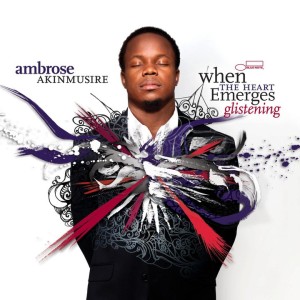Ambrose Akinmusire | When The Heart Emerges Glistening
Ambrose Akinmusire | When The Heart Emerges Glistening
by Brent Faulkner
Free-jazz’s appearance in the 1960s went right alongside the ‘sentiment’ of the times historically; – the idea of liberation from conformity and the conservative tides of the 1950s was ‘what was in.’ Free-jazz never faded away dramatically like some earlier jazz styles (namely dixieland, swing, etc.), but it’s popularity certainly peaked in the 1960s. But as with most styles, they return, and through exceptional and visionary trumpeter Ambrose Akinmusire, he certainly resurrects a style of jazz that hearkens back to the free-jazz of the 1960s that such greats as Ornette Coleman (saxophone), Cecil Taylor (piano), and even John Coltrane in his later years cultivated. No only does he hearken back, but he pushes the boundaries, making When The Heart Emerges Glistening always the ‘forward-thinking’ listen. Ambrose and his crew of spirited and gifted musicians (Walter Smith III, tenor sax; Gerald Clayton, piano; Harish Ragahvan, bass and Justin Brown, drums) make free-jazz sound as relevant in 2011 as it did in 1960. Even the creative title foreshadows the ‘listening feast’ that is ‘When The Heart Emerges Glistening.’
“Confessions to My Unborn Daughter” opens the album exceptionally, starting off with only Ambrose playing a cappella trumpet. Ambrose’s ideas are prodigious and make you ‘hinge’ onto his every note. Things grow even more ‘epic’ when the whole quintet of musicians is assembled: Smith’s tenor sax playing is extraterrestrial, Clayton’s piano playing spacey and genius, Ragahvan’s bass playing serves as the ‘buttress’, while Brown’s drumming is both melodic and metronomic. Filled with beautiful cacophony – a contradiction – “Confessions to My Unborn Daughter” is a brilliant way to open up an album that is filled with nothing short of thirteen tracks of genius.
“Jaya” keeps up the ‘free-jazz’ revival, keeping the listener’s attention easily. Pianist Gerald Clayton delivers some clever improvisations here, followed by superb alternating solos by Akinmusire and Smith. Much like “Confessions,” Akinmusire knocks this cut out of the park! “Henya Bass Intro,” which coincidently features Harish Raghavan on bass alone, foreshadows the mysteriousness of “Henya,” a track to contrasts the more over tone of the first two cuts. Here, balladry changes the mood of the album, but not without some surprises and unpredictability. “Far But Few Between,” a cut that might be considered more an ‘interlude’ (at just under two minutes) sounds as if it on the edge of ‘frenzy,’ hence contrasting any of the soothing calm of “Henya.”
“Regret (No More)” finds Akinmusire supported by Clayton’s tasteful accompaniments on the piano. Beautiful yet experimental, Akinsmusire incorporates numerous extended techniques to make “Regret” more than just a straight ahead performance. “Regret” may have more of a restrained tinge about it, but it is easily one of the album’s most valedictory performances. “Ayneh (Cora),” more of an interlude, follows. “My Name Is Oscar” is by all means shocking, featuring only drums and voice. Here, drummer Justin Brown is given plenty of space and time to express himself in an unexpected, yet brilliant listen. Vocally, there are interspersed spoken passages, with the most prominent being “my name is Oscar.”
After the percussive nature of “My Name is Oscar,” Ambrose opens up “The Walls of Lechuguilla” with some extraordinary sounds, all accomplished using extended trumpet techniques. After Akinmusire solos, once again a cappella, the cut breaks into one big cacophonous eruption, not completely unlike the opener. It may be hard to follow for those who appreciate more ‘straight-ahead’ jazz, but for the consummate enthusiast, it is nothing short of genius. The soloing is prodigious from both Akinmusire and tenor saxophonist Smith.
“What’s New” once more changes the mood, opting for a slightly more traditional sound, which proves to be a nice break from the more intellectually contrived numbers. “Tear Strained Suicide Manifesto” is powerful by all means, possessing an air of mysteriousness. It proves to be another ‘victory lap’ for the grandly talented musician. The album closes as mysteriously as it opened with interlude “Ayneh (Campbell).”
Essentially, When The Heart Emerges Glistening proves to be one of the most captivating jazz albums in recent times. Ambrose Akinmusire is able to revive free-jazz and transcend the boundaries of jazz on this fine effort. Never lacking in inspiration, When The Heart Emerges Glistening is – well – BRILLIANT!
Brent Faulkner
The Urban Music Scene
